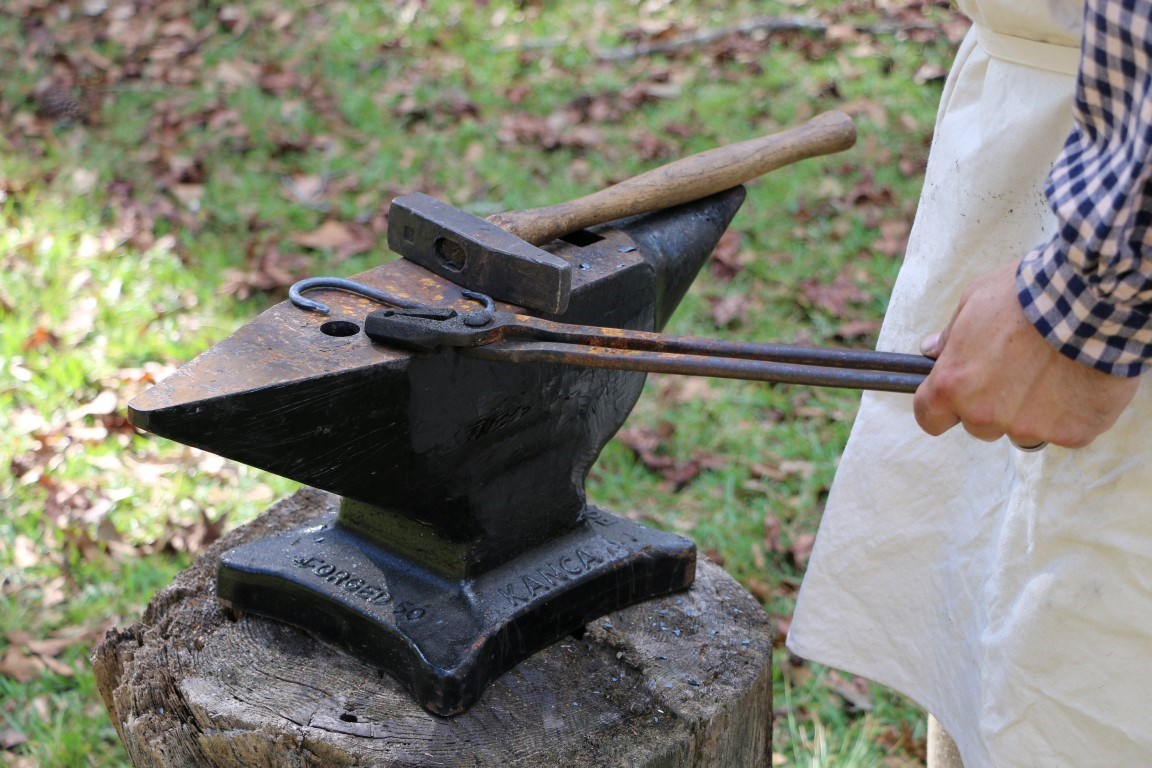
NPS Photo / Nate Toering The blacksmith was one of the most essential tradesmen of any colonial town. They were the one-stop shop for most any item made from metal. They made household items such as pots, pans, and sewing needles. If you needed tools, they made hammers, nails, axes, shovels and more. Blacksmiths even made farm equipment such as plows, cowbells, hoes, and horseshoes. It was not uncommon for blacksmiths to accompany the army into battle as they made parts for guns, knives, swords, and other metal items for soldiers and encampments. Typically, a blacksmith spent most of his time repairing items unless he was a master craftsman who specialized in certain items. To become a blacksmith, you had to become an apprentice at a blacksmith shop at a young age, possibly around the age of thirteen or fourteen. You would have begun an apprenticeship doing menial tasks such as sweeping floors, running errands for the blacksmith, and working the bellows for the forge. Once you had proven yourself reliable, you would move on to assisting with making simple items such as nails or swinging large hammers in assistance to the blacksmith as they worked on complex projects. From there, an apprentice may move on to more complicated and specialized items such as axe heads or lighting. During an apprenticeship, the master blacksmith was charged with giving the apprentice room and board. 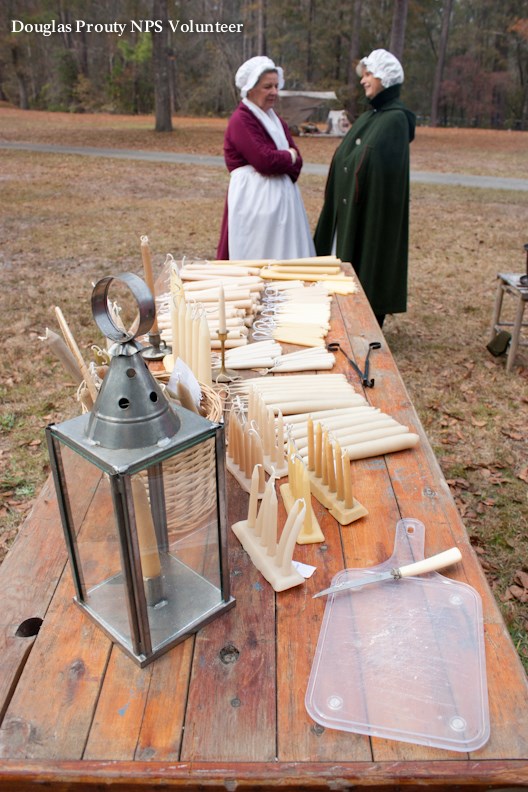
NPS Photo/ Douglas Prouty Being there were no lightbulbs, or even electricity to power them, another important tradesman of the colonial period was the chandler. A chandler is a candle maker, typically a male in larger towns, however in smaller communities or rural farms women often made candles to light their homes at night. Candles were made by first making a wick, from either cotton or linen string. The chandler would then dip the string into hot wax or animal fat. This process continued until the candle reached a desired size. Once the chandler finished dipping their candles, they hung them on a small rack to allow them to dry. After the candle hardened, the wick was trimmed and the candle was ready for use. Those candles made from animal fat did not smell pleasant, but were often cheaper. People with money opted for beeswax when they could, but the supply of beeswax was often limited which added to the cost of the candle. Some chandlers used berries from the bayberry plant to help with the smell, but the process took too long to make it profitable. 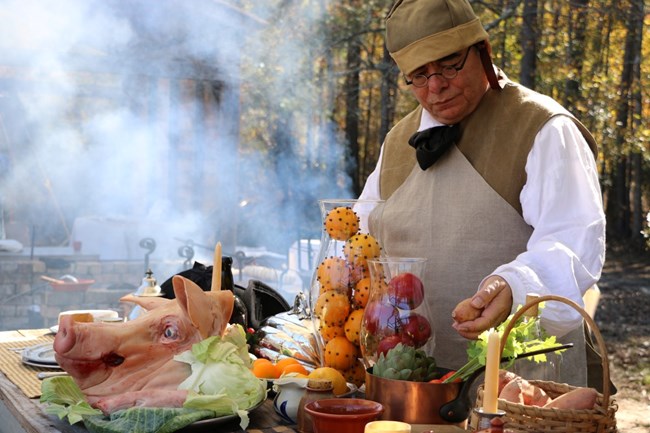
NPS Photo / Nate Toering Have you ever wondered what a soldier might eat on campaign, or who prepared their food? Soldiers were allotted a pound of meat, and a pound of flour a day. Most of the time they did their own cooking by roasting the meat over fire, on sticks. They would make bread such as ash cakes or ash bread by cooking the flour directly in the coals. If they were lucky enough to have a pot, they possibly would have made dumplings. If you are interested in colonial cooking, and would like to volunteer just contact our Volunteer Coordinator for more details. 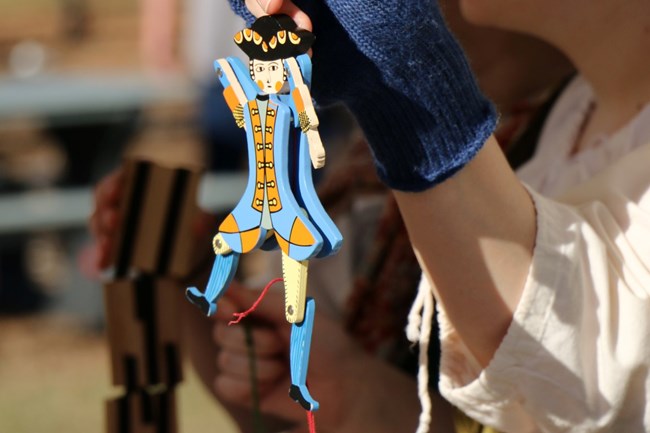
NPS Photo / Nate Toering Children during the colonial period had many chores during the day such as carrying firewood, harvesting crops, sewing, gathering eggs, and making candles. Although children had their fair share of work, most kids found the time to play, as children often do. These games often taught life skills that the children would use later in life such as hand and eye coordination, math, how to follow directions, and how to use one’s own imagination. These games included marbles made of clay, quoits, jump rope, jacks, and graces to name a few. Moores Creek National Battlefield often displays and demonstrates many colonial toys and games during our living history programs. 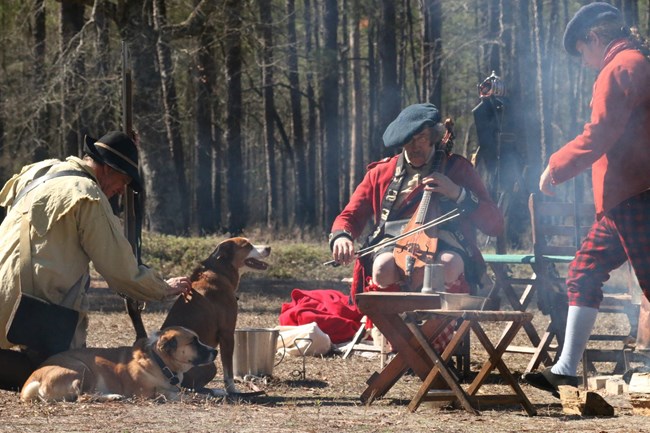
NPS Photo / Nate Toering MusicIn 1776, to listen to music, you would have to make your own. You or someone you knew would have to be able to play an instrument or be able to sing. Civilians and soldiers alike were at the mercy of their own musical ability or the talents of others to provide music. If you wanted the latest music, instead of downloading music to your mp3 or buying a cd, you would have to buy sheet music and play the songs yourself. Moores Creek National Battlefield is always looking for colonial musicains our programs.Do you play a musical instrument of the colonial period? Would you like to particpant in our living hictory programs? Please contact our volunteer coordinator. |
Last updated: February 12, 2024
